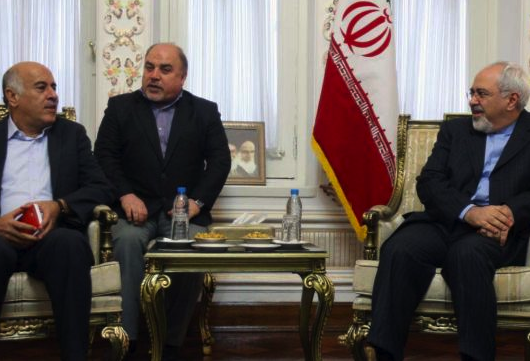The Palestinian Authority is seeking help from Iran in dealing with the Israeli-Palestinian conflict, hoping to pressure Israel–and to send a signal of defiance to the Obama administration. Jibril Rajoub, a senior official of the “moderate” Fatah faction, declared Thursday that Palestinians were “entitled” to seek help wherever they could find it, and that they might return to “armed resistance” against Israel if peace talks were to fall apart.
Earlier this week, Rajoub visited Tehran, meeting with Foreign Minister Javad Zarif, whose official quote was: “For the Iranian government and people, all walks of the Palestinian nation are dear. The Palestinian nation, given its brilliant record of resistance against the Zionists’ aggressions, deserves all-out support from all Muslim and world countries.” Zarif also played a leading role in the negotiation of the recent nuclear deal in Geneva.
According to Khaled Abu Toameh of the Jerusalem Post, Rajoub also backed Iran’s nuclear program Thursday.
Iran does not recognize Israel and has vowed to destroy it. For several years, Iran has funneled weapons and money to Palestinian terror groups in Gaza, continuing a practice that extends back to the tenure of the late Palestinian Authority Chairman Yasser Arafat. Israel does its best to intercept, or destroy, such shipments.
The tactic of invoking an American rival to boost Palestinian efforts against Israel is not a new one. Prior to the fall of the Berlin Wall, the Palestinians enjoyed the patronage of the Soviet Union and various other states and groups that it sponsored. In the Gulf War in 1991, Arafat sided with Saddam Hussein against the United States. In the aftermath, Palestinians had no choice but to deal with the U.S.–Israel’s most critical ally.
Yet Palestinians are increasingly willing to show their independence from American support, despite relying on hundreds of millions of dollars per year in U.S. taxpayer assistance. That may partly be a negotiating ploy, designed to wrest concessions out of an Obama administration clearly inclined to offer them. It also reflects, however, the self-imposed decline of American power in the region, leading to new instability–and threats.
Photo credit: PressTV

COMMENTS
Please let us know if you're having issues with commenting.